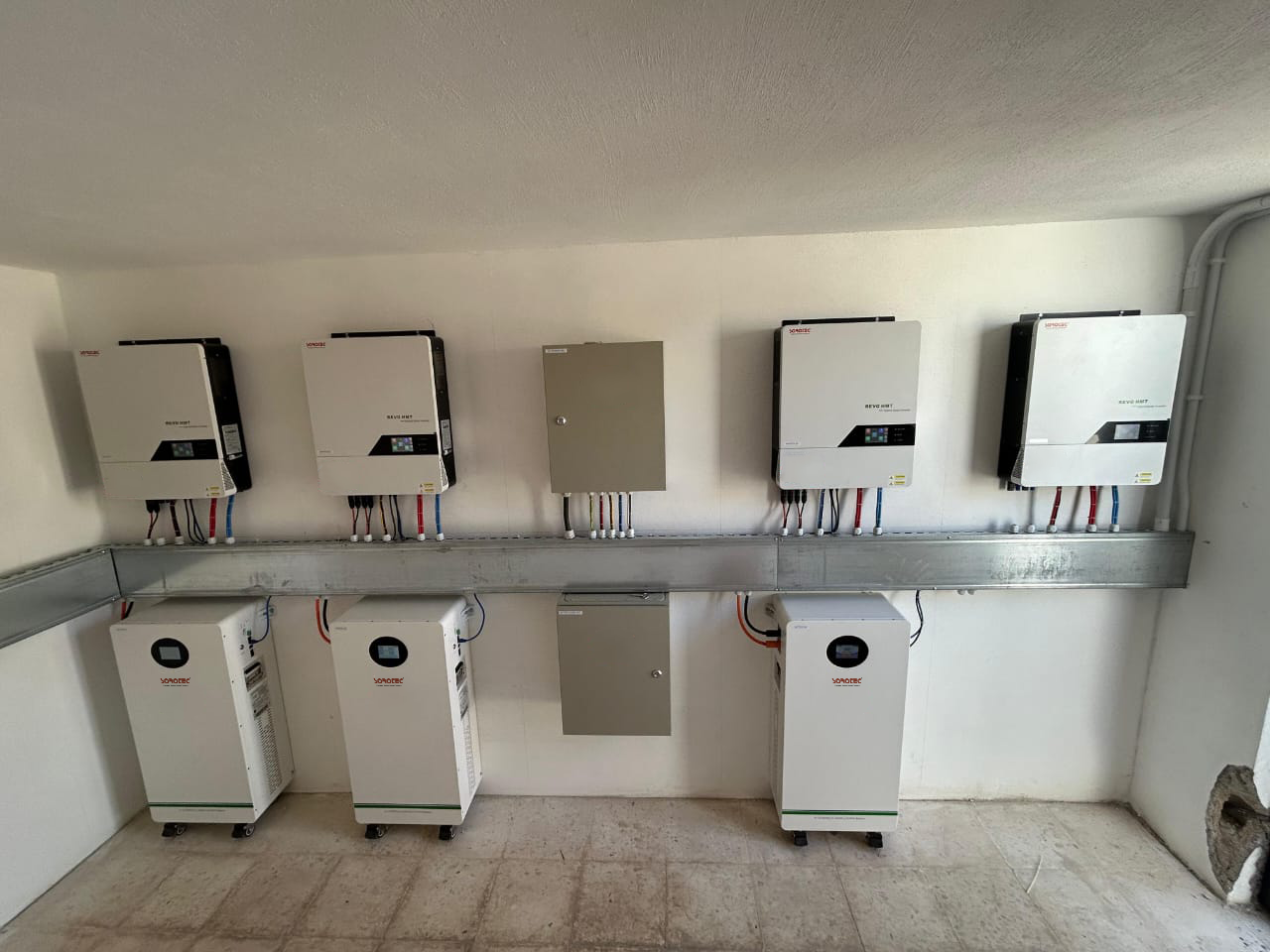Introduction to Solar Power Systems and Battery Types
With the growing demand for renewable energy, solar power systems have become the preferred choice for many homeowners and businesses. These systems typically consist of solar panels, inverters, and batteries: solar panels convert sunlight into electricity, inverters transform direct current (DC) into alternating current (AC) for use, and batteries play a critical role in storing excess energy during the day for use at night or on cloudy days.
There are several types of batteries commonly used in solar power systems, each with its own advantages and disadvantages. The most common types include lead-acid batteries, lithium-ion batteries, and emerging technologies such as flow batteries and sodium-sulfur (NaS) batteries. Lead-acid batteries are the earliest and most widely used type, known for their low cost and reliability. On the other hand, lithium-ion batteries offer higher energy density, longer lifespan, and faster charging times but come with a higher initial cost.
Comparative Analysis of Battery Types in Solar Applications
Lead-Acid Batteries:
Lead-acid batteries are the most widely used traditional battery type in solar power systems, valued for their low cost and proven reliability. They come in two main forms: flooded and sealed (such as gel and AGM). Flooded lead-acid batteries require regular maintenance, while sealed types require little maintenance and generally last longer.
Advantages:
- Low initial cost, proven technology
- Suitable for various applications
- Reliable
Disadvantages:
- Lower energy density and limited storage capacity
- Shorter lifespan (usually 5-10 years)
- Higher maintenance requirements, especially for flooded types
- Lower depth of discharge (DoD), not ideal for frequent use
Lithium-Ion Batteries:
Lithium-ion batteries have become increasingly popular in solar power systems due to their superior performance characteristics. They offer higher energy density, longer lifespan, and faster charging times compared to lead-acid batteries. Additionally, they have a lower self-discharge rate, meaning they can store energy for longer periods without significant loss.
Advantages:
- Higher energy density (more power in the same space)
- Longer lifespan (usually 10-15 years)
- Lower self-discharge rate
- Faster charging times
- Low maintenance requirements
Disadvantages:
- Higher initial cost
- More complex installation and management
- Potential safety risks with certain types (e.g., lithium cobalt oxide)
Emerging Technologies:
Flow batteries and sodium-sulfur (NaS) batteries are emerging technologies that show promise for large-scale solar power storage applications. Flow batteries offer high energy efficiency and long cycle life but are currently more expensive than other options. Sodium-sulfur batteries have high energy density and can operate in high temperatures but face challenges with high manufacturing costs and safety concerns.
Factors to Consider When Choosing a Solar Battery
- System Power Requirements:
The power needs of your solar power system will determine the battery size and capacity required. Higher power systems will need larger batteries with higher storage capacity. - Storage Capacity:
The battery’s storage capacity is critical in determining how much energy can be stored and used during periods of low sunlight. Systems with higher power demands or located in areas with less sunlight should opt for larger storage capacities. - Operating Environment:
Consider the battery’s operating environment. Batteries in extreme temperatures or harsh conditions may need additional protection or special treatments to ensure optimal performance and lifespan. - Budget:
While the initial cost of the battery is an important factor, it should not be the only consideration. Long-term costs, including maintenance, replacement, and potential energy savings, should also be factored into the decision. - Maintenance Needs:
Some battery types, such as lead-acid batteries, require regular maintenance to ensure optimal performance, while lithium-ion batteries typically require less maintenance. When choosing the right option, consider the maintenance requirements of different battery types.
Leading Brands and Models of Solar Batteries
Several leading brands offer high-quality solar batteries with advanced features and specifications. These brands include Tesla, LG Chem, Panasonic, AES Energy Storage, and Sorotec.
Tesla Powerwall:
Tesla Powerwall is a popular choice for residential solar power systems. It offers high energy density, long lifespan, and fast charging times. The Powerwall 2.0 has a capacity of 13.5 kWh and works seamlessly with solar panels to provide energy storage and backup.
LG Chem:
LG Chem provides a range of lithium-ion batteries designed for solar applications. Their RESU (Residential Energy Storage Unit) series is designed specifically for residential use, offering high energy efficiency and long cycle life. The RESU 10H model has a capacity of 9.3 kWh, ideal for systems with moderate energy needs.
Panasonic:
Panasonic offers high-quality lithium-ion batteries with advanced features such as high energy density, long lifespan, and low self-discharge rates. Their HHR (High Heat Resistance) series is designed for extreme environments, delivering excellent performance in high-temperature conditions.
AES Energy Storage:
AES Energy Storage provides large-scale energy storage solutions for commercial and industrial applications. Their Advancell battery systems offer high energy efficiency, long cycle life, and fast charging times, making them ideal for large solar power installations that require high energy storage capacity.
Sorotec:
Sorotec’s solar batteries are known for their high cost-effectiveness, designed for residential and small commercial users who seek practical and economical solutions. Sorotec batteries combine excellent performance with competitive pricing, offering long lifespan, high energy density, and stable output. These batteries are a great choice for medium-sized solar systems, with low maintenance costs, making them ideal for users with budget constraints who still require reliable energy storage.
Conclusion and Recommendations
When choosing the right battery for your solar power system, it is essential to consider factors such as system power requirements, storage capacity, operating environment, budget, and maintenance needs. While lead-acid batteries are widely used due to their affordability and reliability, they have lower energy density and shorter lifespan compared to lithium-ion batteries. Lithium-ion batteries offer superior performance and longer lifespan but come with a higher initial investment.
For residential solar systems, Tesla Powerwall and LG Chem RESU series are excellent choices due to their high energy efficiency, long lifespan, and fast charging times. For large-scale commercial and industrial applications, AES Energy Storage provides energy storage solutions with exceptional energy efficiency and durability.
If you are looking for a cost-effective battery solution, Sorotec offers high-performance batteries at competitive prices, ideal for small to medium-sized systems, especially for users on a budget. Sorotec batteries deliver reliable energy storage while keeping maintenance costs low, making them suitable for residential and small commercial applications.
Ultimately, the best battery for your solar power system depends on your specific needs and budget. By understanding the pros and cons of each battery type, and considering your system’s power requirements and usage environment, you can make an informed decision and select the most suitable energy storage solution.
Post time: Nov-28-2024







